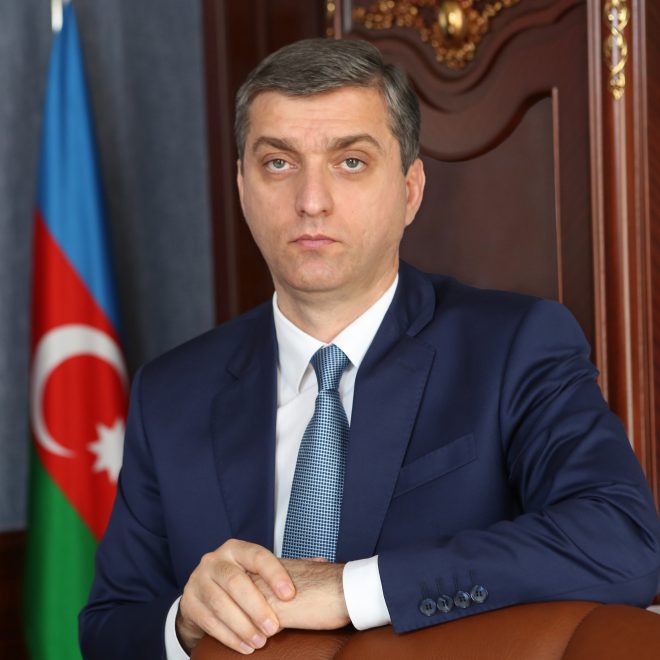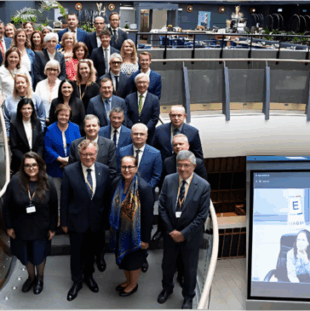Commemorating the 100th Anniversary of National Leader Heydar Aliyev: Reflections on the establishment of the Chamber of Accounts

After the collapse of the former Union of Soviet Socialist Republics (USSR) on October 18, 1991 the national independence of the Republic of Azerbaijan was restored and Azerbaijan could have an opportunity to pursue an independent policy through the realisation of its sovereign economic and political rights, and switch to a free market economy. Azerbaijan struggled to carry out the transformation processes necessary for the future development of the country in the first years of its independence, facing very serious political, economic and military cataclysms. In this complex and contradictory time, Heydar Aliyev, returned to Baku, Azerbaijan from exile in the summer of 1993 to take on the reform challenges. On October 3, 1993, Heydar Aliyev was elected as the President of the Republic of Azerbaijan with the trust of the people. Heydar Aliyev regained stability of the country in a short period and laid the fundamental foundation for the future development. To achieve future development of the country and solve the problems ahead primarily it was necessary to save an economy from crisis. Heydar Aliyev, who had many years of management experience, wasted no time in launching a series of economic reforms.
Under National Leader Aliyev’s chairmanship, the Republic of Azerbaijan adopted its new Constitution in November 1995, and laid the legal basis for large-scale national economic programs, which is now the main source of all existing normative legal framework (legal act framework) for economic legislation. Azerbaijan embarked on a new stage of development. During that period, Azerbaijan recovered the potential losses due to economic growth and achieved results, such as a significant reduction in the unemployment rate. In addition, the country’s strategic currency reserves were formed, trust in the banking system was restored, and a stable source of funding for the state budget were identified. Azerbaijan embarked on a number of cooperative infrastructure construction projects as well, including the Baku-Tbilisi-Ceyhan oil export pipeline.
The growing economic development of Azerbaijan and increase of foreign exchange reserves in the country from year to year created the need to improve existing mechanisms in the field of financial control. National Leader Aliyev acted as the main initiator in determining the constitutional status of the Azerbaijan Chamber of Accounts by adding the institution to Article 92 of the Basic Law, which deals with the “Organization of the work of the Milli Majlis of the Republic of Azerbaijan”, in drafting the first national Constitution of the Republic of Azerbaijan.
National Leader Aliyev, taking into account the need to rebuild and improve the system of financial control of the state, began to implement measures of great importance in the creation, implementation and development of the state control mechanism. In this regard, National Leader Aliyev signed two important documents: Decrees No. 463, dated June 17, 1996 “Regulation of the public control on the production, service, and financial-credit activity and prohibition of unreasonable controls”, and; Decrees No. 69, dated January 7, 1999 “On the improvement of State control system and elimination of artificial obstacles to development of entrepreneur activity”.

The reforms of economic content carried out by National Leader Aliyev are internal: they made it necessary to implement external state financial control by the Ministry of Finance of the Republic of Azerbaijan as the relevant executive authority, and the Chamber of Accounts of the Republic of Azerbaijan subordinate to Milli Majlis (or, the National Assembly, which serves as the legislative branch of government in Azerbaijan), which is the highest representative body of the State, which is not included in the executive body of the State.
For this purpose, in 1999, with the adoption of the Law “On the Chamber of Accounts” of the Republic of Azerbaijan, the foundation of the external state financial control institute was laid. After that, in 2001, National Leader Aliyev, as the head of state, used the right of legislative initiative and proposed additions and changes to the Law with the aim of adapting the activity of the Chamber of Accounts to international standards. With these additions and amendments, provisions reflected that the Chamber of Accounts should have organizational and functional independence as a permanent state budgetary-financial control body subordinate to the Milli Majlis of the Republic of Azerbaijan. The provisions also expanded the scope of its activity and raised the legal status of the Members of the Chamber.
In that period, with the purpose of determining the basics of organizing and regulating the work of the Chamber of Accounts of the Republic of Azerbaijan, the Internal Regulations of the Chamber of Accounts of the Republic of Azerbaijan were approved by the Law of the Republic of Azerbaijan on March 5, 2002, and updated in 2008.
An updated law, “On the Chamber of Accounts” was adopted in 2018. The law regulates the status of the Chamber of Accounts, the legal bases of its activity, the structure of management and organization, as well as external objects of state financial control and relations with other parties in the field of providing state supervision of the efficient, legal, purposeful use of state funds and other state property. This law has increased the responsibility of the Chamber of Accounts for the protection of state funds and the effective and economical use of these funds, providing a legal platform for the regulation of the activities of the Chamber Accounts in accordance with international practice.
The Chamber of Accounts carries out external state financial control activities in accordance with the methodological documents prepared by the Chamber of Accounts based on the Law “On the Chamber of Accounts of the Republic of Azerbaijan” and the International Standards of the Organization of Supreme Audit Institutions (INTOSAI). This legal mechanism was the basis for taking necessary measures in the direction of adapting and integrating the Chamber’s activity to international audit standards more effectively. International cooperation is also outlined in this law as one of the four main activities of the Chamber. For this reason, the Chamber of Accounts is a member of international audit organizations, such as INTOSAI (International Organization of Supreme Audit Institutions), EUROSAI (European Organisation of Supreme Audit Institutions), ASOSAI (Asian Organization of Supreme Audit Institutions) and ECOSAI (Economic Cooperation Organization of Supreme Audit Institutions), and closely cooperates with them.
The Chamber of Accounts of the Republic of Azerbaijan, established in 2001 on the initiative of National Leader Heydar Aliyev, has successfully fulfilled the tasks assigned to it by exercising its legal rights for more than 20 years of activity, and continues its activities within the framework of the policy successfully implemented by the current President of the Republic of Azerbaijan, Ilham Aliyev.
In the year 2023, which has been declared as the “Year of Heydar Aliyev” by the Presidency, the Chamber of Accounts responsibly declares that it will try to fulfill all the duties assigned to it as the supreme audit institution. With this, the Chamber aims to strengthen the application of the principles reflected in INTOSAI-P 12, which envisages creating value for society and bringing positive changes to the lives of citizens by the supreme audit authority.





